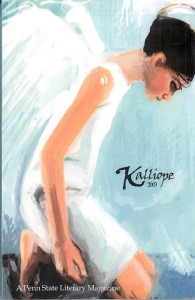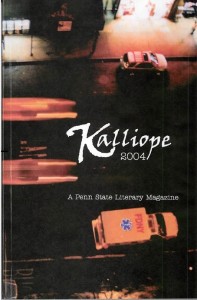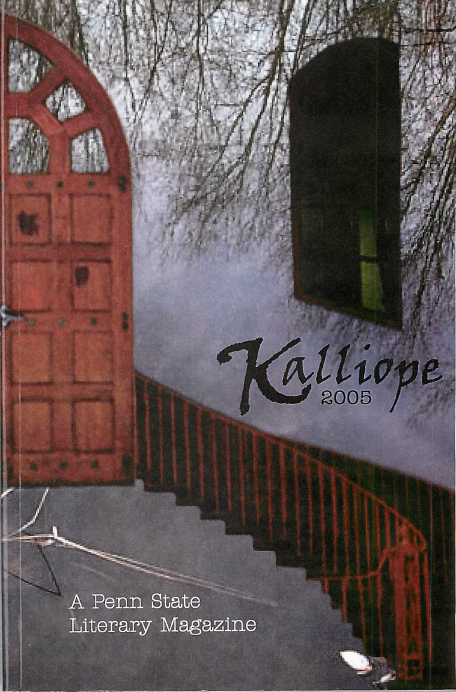By: Brianna Zigler ~
Before Joseph Bueter was teaching Creative Writing at Penn State University, he was writing creatively on his own as a student at the very university where he now educates others. Bueter is currently a Lecturer and Digital Education Specialist in the Department of English at Penn State, but during his undergraduate student years, he published his own poetry in Penn State’s literary magazine, Kalliope, not once but multiple times, in each of the four editions of the magazine produced from 2003-2006. This Penn State student-turned-faculty-member seems a fitting addition to “Musings.”

“The Jocund” was published in Kalliope 2003
After graduating from Penn State in 2005, Bueter went on to earn an MFA at University of North Carolina Wilmington. He has published poetry in The Southern Humanities Review, Vassar Review, Confrontation, Nashville Review, Poet Lore, Cave Wall, Tar River Poetry, as well as other journals. He has also participated in the Joaquin Miller Cabin Poetry Series in Rock Creek Park, Washington, DC, and he has been a resident at the Virginia Center for the Creative Arts. As a former poetry editor of Ecotone and reader for Waccamaw Journal, Bueter has also helped produce literary journals.
To discover more about Joe and his work, we decided to ask him to select three of his favorite pieces published in Kalliope to be revived on “Musings,” and I asked him a few short interview questions to go along with his selections. As a writer myself, I was interested in hearing him reflect on his work from many years ago and the choices he made when he, too, was a young writer in college.
Poems Selected:
We asked you to choose three out of the eight poems you had published in Kalliope; what made you decide on the three that you did?

“Warm Lakes” was published in Kalliope 2004.
These three poems were written at different times during college. I wrote “The Jocund” during my first year, “Warm Lakes” some time during my sophomore year, and “Chore in a San Francisco Suburb” later on. They seem to me to represent different priorities—of language, of voice, of content. I wasn’t thinking about what kind of writer I wanted to be. It was easy to just write. “The Jocund” was fun to write, and I remember not feeling any pressure when writing it. Reading the poem today, I see ideas about images I don’t consider anymore. The little risks I took by bending realism, combined with the interplay of the physical space of speaker to images, remind me of some things I don’t try anymore. I worked at revising “Warm Lakes.” It was probably one of the first poems where I understood revision as its own worthy process. I met with Professor Becker about this poem and that meeting led to understanding that there is a precision of a first draft and a precision that can be achieved through additional drafts. “Chore in a San Francisco Suburb” is a poem that probably helped me get into grad school. I didn’t remember it, so I’m happy to read it again.
How would you describe your writing process?
My process is different depending on the poem, which I know isn’t unique, but it’s also a little sentence I need to tell myself. And I need to repeat it—like a mantra—because it’s too easy to get frustrated when a series of moves, that previously delivered a successful poem, suddenly doesn’t work out. Writing doesn’t parallel a task like studying. When studying, the environment where you study should replicate, as much as possible, the environment where you take the exam. Similarly, if you study successfully with outlines, then outlines will likely help again.

“Chore in a San Francisco Suburb” was published in Kalliope 2005
But for poetry, I need variation and I need tricks. One trick that often triggers writing is going for a walk or riding the bus for a while. I think because movement produces rhythms that I can start fitting words over without thinking too hard about what I’m writing. Music works too.
What made you want to pursue a career teaching creative writing? And when did you realize this was what you wanted to do?
Outside of actually writing or reading, there seemed to be nothing more interesting to do with my time than working with others on their writing. When I first started teaching in grad school, I’d brag to my friends about preparing for class by reading David Sedaris or organizing Mad Libs-style word games. I also felt like I would have different and compelling daily challenges as a teacher, which has been the case. I realized teaching was what I wanted to do about the same time I knew I wanted to write as an active part of my day-to-day life. Teaching as a way to allow for space to write doesn’t quite work that simply. But by the end of my first year in college, I knew I wanted to try teaching college-level creative writing.
If you could go back in time and change one substantial thing in any of the poems you had published in Kalliope, back when you were a student, what would it be? And if not, then why?
In a cliché way, I find myself stressing over punctuation issues I now feel strongly about. Serial commas! Beside commas, I would want another chance at the structure and line breaks of “Chore in a San Francisco Suburb,” mostly because I’ve turned philosophically about how this kind of poem can be paced and what line breaks can isolate in terms of sounds and ideas.
————————————————————————————————————-
Check out Joe Bueter’s most recently published poem, “Red Doors,” published in Nashville Review in 2011.